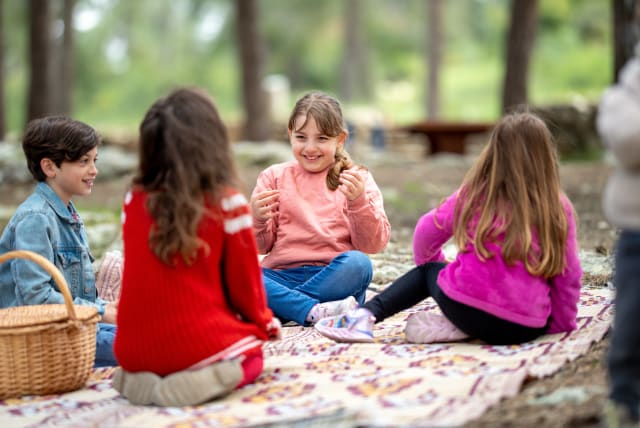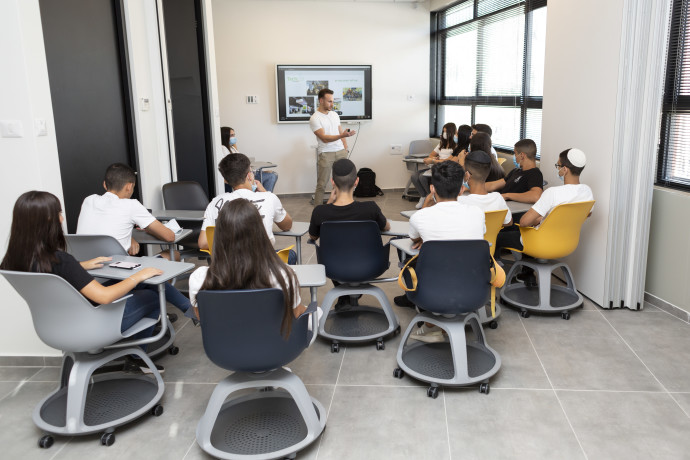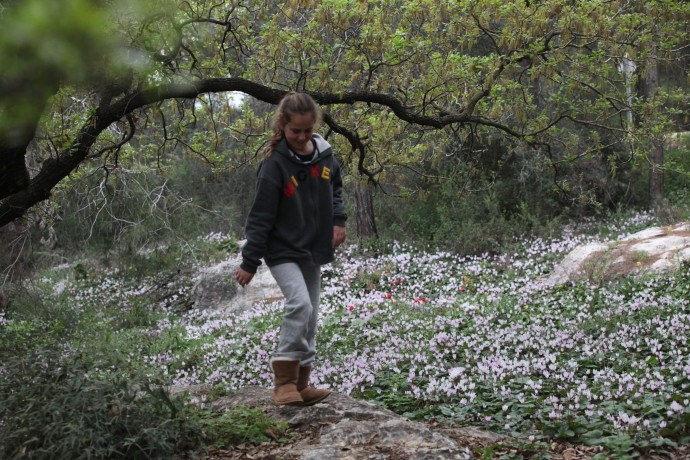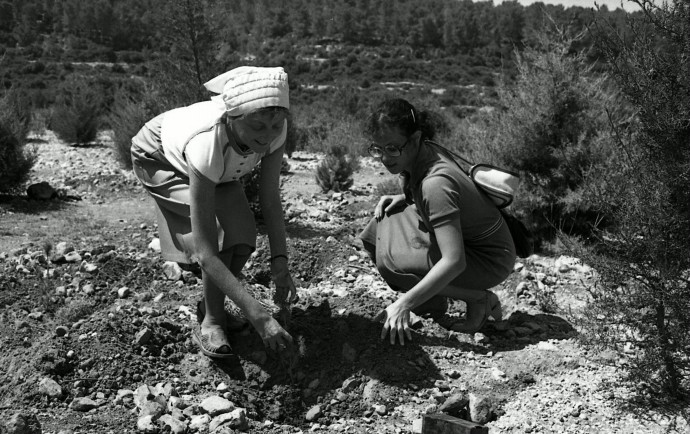KKL-JNF: Over 120 years of the realization of the Zionist vision in Israel

The organization has three important divisions: Planning, Resource Development, and Education – that are among the many areas in which KKL-JNF is working actively for the benefit of Israel.
Strolling down King George Street in central Jerusalem, one cannot help but be impressed by the imposing headquarters of Keren Kayemet LeIsrael-Jewish National Fund (KKL-JNF), part of the complex of Israel’s national institutions buildings. KKL-JNF, founded in 1901, in its 12th decade of operation, has been a part of Israel’s national fabric for so many years that Avi Moussan, director of Education and Community for KKL-JNF, says, “For many people, KKL’s existence is taken for granted. Our message is that nothing can be taken for granted. Anything that is worth keeping requires investment and effort.”
Recently, this writer met with three of KKL-JNF’s leaders – Avi Moussan; Noah Tal, director of the organization’s Planning Division; and Ronnie Vinnikov, head of Resource Development and External Affairs – to learn more about the vital role that KKL-JNF has played since the establishment of the State of Israel, and its continuing efforts in improving the country.
“Coming to KKL-JNF from the outside,” says Tal, “I didn’t know how much KKL-JNF was doing for the State of Israel. It is truly amazing to see that wherever you go in Israel, KKL-JNF is there.” Tal says that the scope of KKL-JNF’s activities is expressed in the brown, green, and blue organizational logo. “The color brown represents all the work that we do in agriculture,” she explains, “including agricultural research and clearing the soil of rocks. Green represents the forests and all that we do for the environment. Blue stands for the reservoirs and forest streams we maintain and purify. And finally, the tree in the logo symbolizes everything together. Without soil and water, there are no trees; and without forests, there is no life here in Israel.”
Planning the future of Israel’s forests, she says, is vital. “If you don’t have planning, you don’t have the ability to act.
Our main role is to ensure that we will have the forest today, in ten years, and in future generations.” Tal notes that it is becoming more challenging to secure the future of the forests in Israel. “It is becoming harder to protect the forests because there is no forest protection law,” she says. “Our role is to speak for the forest in the planning institutes of Israel.”
KKL-JNF, says Tal, is promoting a forest protection law and wants to ensure that the forest has a seat in the planning institutes of Israel. She quotes the UN declaration at the UN Climate Change Conference in 2021 in Glasgow that stated that forests are considered among the most productive land-based ecosystems essential for life on Earth.
Tal points out that Israel’s forest areas, which comprise two million dunams, are shrinking. “When I started with KKL-JNF, the forests comprised eight percent of Israel’s land. Today, it is at seven percent. All the countries that signed the UN Glasgow Declaration committed to increase their forest areas by three percent, and that is what we are trying to do through the strategic plan for the forest.”
The pandemic, which restricted travel, greatly strengthened the connection between the Israeli public and the forests, says Tal. “People discovered forests outside their window, not just for the beautiful view but as something they must have in order to have quality of life. Since corona, many more people are going to Israel’s forests.” As a result, she adds, the Israeli public is much more engaged in forests and is more aware of the importance of the forests in their lives.
“We have community forests all over Israel, and we see how much the community wants to participate. Community is a huge part of our ability to protect the forest. When the community speaks up and says how important the forest is and is opposed to buildings or roads or any other infrastructure being built in the forest, that helps us a great deal to ensure that we will continue to have forests in Israel,” she asserts.
Ronnie Vinnikov, head of Resource Development and External Affairs for KKL-JNF, points out that the organization, which was founded in order to raise money to purchase land in Israel, became the primary tool for the Jews of the Diaspora and the Jews living in Israel in building the Land of Israel. “We have partner JNF organizations in 40 countries, which assist us in raising funds,” he says, adding that many Jews identify with Israel by giving money to KKL-JNF for planting a tree, a grove, or preparing a reservoir.
In addition, says Vinnikov, KKL-JNF maintains professional connections with US-based and European forestry organizations, as well as the UN, the EU, and dozens of other organizations. “From Zion shall go forth Torah,” says Vinnikov, referring to Israel’s environmental know-how. “All of our experience here in Zion – planting trees in dryland conditions, rehabilitating desertified landscapes, maximizing watershed management and holistic planning – we share with the world, such as Chad, Kenya, Argentina, Mexico, and European and Mediterranean countries.”
Vinnikov cites a recent EU grant that KKL received two years ago as part of the international consortium SureNexus, to conduct research with Ma’aleh Gilboa, MIGAL, and Doral Energy on Agrovoltaics, using solar panels with agriculture to create a nexus of electricity production, efficient water use and shade to protect the crops from excess radiation, to produce a better crop while generating electricity. He adds that Kenya’s president, who visited Israel recently, was so impressed with the KKL-JNF forests that he asked for help in planting a “Zion Forest” in Kenya, which KKL-JNF will soon begin.
Vinnikov points out that KKL-JNF is utilizing its vast experience in forestry and land restoration to combat climate change and is continually looking for new ways to achieve this goal. “KKL-JNF’s chief scientist, Dr. Doron Markel, is conducting research, investing in ways that Israel can use its experience to benefit the world in the climate crisis.” In addition, says Vinnikov, KKL-JNF is spearheading research and development in technologies designed to reduce emissions and increase carbon fixation, including KKL-JNF’s Climate Scholarship Program, a scholarship program for 36 doctoral students whose doctoral research is in the field of climate crisis, as well as its Climate Solution Prize, conducted in conjunction with JNF Canada, which offers $1 million in prizes for groundbreaking research to mitigate the climate crisis. “In these ways,” says Vinnikov, “we are strengthening Israeli research and raising Israel’s profile in the world.”
In that vein, says Vinnikov, KKL-JNF has recently established a special climate unit whose goal is to consolidate KKL-JNF’s experience in the field and direct it toward this purpose. He adds that the organization has invested half a billion shekels in 2023 in this area. “We expect this to become our flagship program in the coming years,” he notes.
KKL-JNF will play an active role in the upcoming UN Climate Change Conference (COP 28), which will be held in the United Arab Emirates this coming December, and at Expo 2025, which will be held in Osaka. “We are happy to present our research on forecasting fires and using hi-tech devices, such as drones, that provide information to control centers as to the location of the fires so that they can be extinguished immediately with special mobile units that can reach all areas in the forest.
“We are the only organization that offers free access to its forest sites and parks,” says Vinnikov. “The Jewish people established KKL-JNF, and through their generosity we are able to contribute one of Israel’s most valuable environmental resources and provide a better quality of life for the people of the State of Israel.”For Avi Moussan, director of Education and Community for KKL-JNF, it is impossible to discuss buying and redeeming the Land of Israel without discussing the topic of education. “In the end,” he says, “people who want to be a part of Zionism have to be educated about the subject.”
The educational process of KKL-JNF, says Moussan, is not only learning about Zionism but becoming an active partner. “The act of planting a tree is an educational act by adding to the forest and touching the earth. When you have a connection to the land, you will not damage it and will want to be a part of it.”
Moussan says that all of the educational partnerships that KKL-JNF has with schools and institutions are designed to inculcate a love of the Land of Israel through four principles: Zionism; a love of the land; the heritage; and the environment. “We do this by following three principles – learning, experience, and encouraging activism,” he says. “If I can teach the history of the surroundings, and I can experience it by touring and going in the water, then I can encourage someone to activism, who will want to preserve the place and keep it clean.”
KKL-JNF works with all educational networks in Israel, both informal and formal, leading trips and educational activities, many of which are linked to the Jewish holidays, such as slihot tours prior to Rosh Hashanah. Moussan also cites the Maof program, conducted with 50 municipalities, whose purpose is to narrow educational gaps in settlements in Israel’s periphery.
Speaking of the periphery, Moussan takes pride in mentioning KKL-JNF’s Heritage Centers, specially designed buildings with state-of-the-art technology that serve as inviting after-school venues for teens in peripheral communities. Their programs promote academic achievement and creative discovery in tandem with Zionist and environmental awareness and values. The first KKL-JNF Heritage Center opened in Nof HaGalil in March 2018. The second KKL-JNF Heritage Center, located in Kiryat Malachi, opened in September 2020. Additional Heritage Centers have been slated for Sderot, Ofakim, Beit She’an, Acre, Safed, Kiryat Shmona, and Migdal HaEmek.
“Education and community in KKL-JNF is very important,” concludes Moussan. “It connects everyone in Israeli society and provides opportunities for people who have not had them previously. We in the Education Department at KKL get up each morning with a goal and a mission to do good.”
These three important divisions at KKL-JNF – Planning, Resource Development, and Education – are among the many areas in which KKL-JNF is working actively, continuing to ensure its relevance and importance for the State of Israel.
This article was written in cooperation with KKL-JNF.
Jerusalem Post Store
`; document.getElementById("linkPremium").innerHTML = cont; var divWithLink = document.getElementById("premium-link"); if (divWithLink !== null && divWithLink !== 'undefined') { divWithLink.style.border = "solid 1px #cb0f3e"; divWithLink.style.textAlign = "center"; divWithLink.style.marginBottom = "15px"; divWithLink.style.marginTop = "15px"; divWithLink.style.width = "100%"; divWithLink.style.backgroundColor = "#122952"; divWithLink.style.color = "#ffffff"; divWithLink.style.lineHeight = "1.5"; } } (function (v, i) { });



